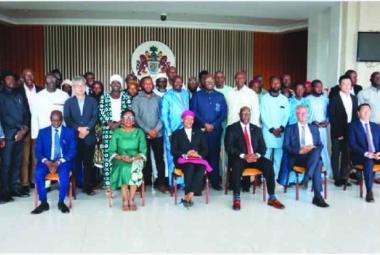KAIRABA HOTEL – THE GAMBIA
January 2020
- Madam Speaker and Honourable Members of the National Assembly
- The Representative from African Union Commission and New Partnership for Africa’s Development (NEPAD);
- Honorable Cabinet Ministers
- Representative from WFP Regional Bureau for West & Central Africa
- The Director of WFP Africa Office in Ethiopia;
- The UN Resident Coordinator and the UN Family in The Gambia;
- The Country Director of WFP in The Gambia;
- The Governors and Mayors;
- The Executive Director of NaNA;
- Representatives of the Diplomatic and Consular corps;
- Senior Government Officials here present;
- Members of the press;
- Distinguished Ladies and Gentlemen;
- All other protocols duly and respectfully observed.
It is with immense honour and privilege that I address you all today as we launch and celebrate the completion of the landmark study of the Cost of Hunger in Africa Study - The Gambia Report.
The Gambia is among over 26 countries globally, to validate the COHA findings, with about 20 of those countries being in Africa. In The Gambia the study has been undertaken by a multi-stakeholder National Implementation Team, under the leadership and guidance of NaNA, and with the technical support of the World Food Programme and the Economic Commission for Latin America and the Caribbean. I thank you all for your immense contribution in actualizing this study.
The Cost of Hunger in Africa Study, is an African Union initaitive that received endorsement at the highest level from the African Heads of State and Government. This endorsement solidified an earlier resolution passed by the African Ministers of Finance and Economic Development in 2012, who initially validated the methodology that was adapted and rolled out continent wide. Noting the benefits of the study, in June 2018, the Government of The Gambia through the Office of the Vice President officially requested to be part of the study.
With approval from the African Union Commision, the OVP commissioned the start of the study through a kickoff event in December of the same year. This is a clear demonstration of both my government and the African Union’s commitment to address malnutrition on the continent, and we are indeed very pleased to have participated in this study as it represents a unique and timely contribution to help us understand the impact of child undernutrition in our country’s socio-economic development. This is also in line with our quest to promote food and nutrition security, as enshrined in the National Development Plan (NDP).
By achieving the food and nutrition security targets set out in our NDP, we by intent, align to various continental and global agendas and strategies including the African Regional Nutrition Strategies, the Continental Agenda 2063, and by extension the Sustainable Development Goals – especially SDG-2 to achieve zero hunger globally. While The Gambia is grabblingg with multiple challenges, we cannot afford to ignore the development and emphasis on human capital, which is the country’s driving force to achieving the NDP.
While this is the time to reflect on the road we have traversed, we are humbled in acknowleging with pride the improvement of the nutritional status of Gambians. This is the result of concerted, multi-stakehoder efforts, yet while this is commendable, more is needed to sustain gains being made, by identifying the challenges we contimue to face and to seek lasting solutions to them in a sustainable and multilateral manner.
Excellencies, Ladies and Gentlemen,
With this high-level gathering today, we are reaffirming the Government`s commitment to addressing malnutrition, and we demonstrate this by launching yet another key nutrition milestone, following the Zero Hunger Report launched in 2018, and the recently launched Scaling Up Nutrition Business Network in 2019.
The report findings are revealing, and as I listened to the presentation made earlier, I could not help but be alarmed that we are losing 5.1% of our national GDP, annually, equivalent to GMD 3.96 billion or USD$83.4 million because of the consequences of child undernutrition onb school performance, health and productivity. This is a leaking bucket that we can and must prevent from continuing to leak. As you have heard prevention is cheaper than paying for the high costs resulting from the consequences. We can prevent the scrouge from limiting the full potential of our people. The challenges of undernutrition are not difficult to address if adequate evidence is presented to policy and decision-makers and when right decision and strategies are taken.
This is what the Cost of Hunger in Africa study aims to do – to raise awareness by presenting the evidence base and the justification for the need for increased investment to scale up proven cost effective nutrition interventions that are backed by strong national committed leadership.
The other aim of this study is, to increase awareness among stakeholders about the fact that nutrition, as a multi-causal problem, requiring multiple solutions. This indicates that the battle of eliminating undernutrition cannot be fought by a single actor but by joining forces and strategizing for concerted action in a more coordinated and accountable manner. National efforts must be harmonized with more extensive regional and global efforts for maximum impact in our quest for a malnutrition free Gambia.
The Office of the Vice Presidentwill support to continue the inclusion of financial support to nutrition interventions in the country, having realized that if undernutrition is left unaddressed, it has serious adverse effects on the development of the county.
Undernutrition, particularly, the prevalence of stunting which irreversably impedes child physical development and cognitive abilities, is still high in The Gambia at 15.7 percent, although the rate was much higher five years ago at 24.5%. This translates to 1 in every 6 children, which is an indication that chronic food and nutrition insecurity is still prevalent. The reporting of the high prevalence of stunting does not end here. The preliminary findings of the study in The Gambia revealed further intertwined challenges of undernutrition impacting on the nation’s productivity and the economy.
Ladies and Gentlemen,
Even though Malnutrition rates continue to decline in The Gambia, we remain on course to acheieving the nutrition targets set in the NDP - reducing stunting to 12.5%, wasting to 5% and underweight to 8.5% by 2021. The Government of The Gambia is committed to working with all the partners through the NDP and beyond, which aims to build a prosperous nation with a healthy and well-developed human resource. It is all based on a shared conviction that hunger and undernutrition can be eliminated in our lifetimes in The Gambia. Together with partners like the EU, World Food Programme, UNICEF, FAO, private sector and civil society among others, we can achieve great success.
Before I conclude, I would like to take this opportunity to thank the African Union Commission and NEPAD Agency, The Economic Community of Latin America and Caribbean, EU, WFP and other UN agencies and development organizations for recognizing the value of the study and supporting its implementation.
On behalf of the Government of The Gambia, I would also like to express my profound appreciation to the dedication and tireless efforts of the National Implementation Team, and NaNA’s leadership. Without the time, experience, commitment, sacrifice and insight you provided, we would not have reached this milestone.
In conclusion, I believe that together we can achieve Zero Hunger, we can prevent, and even eliminate child undernutrition in our lifetime!. With this remark, I now have the singular honour and previlage to officially launched the COHA Gambia Report.
Thank you all for your attention.






